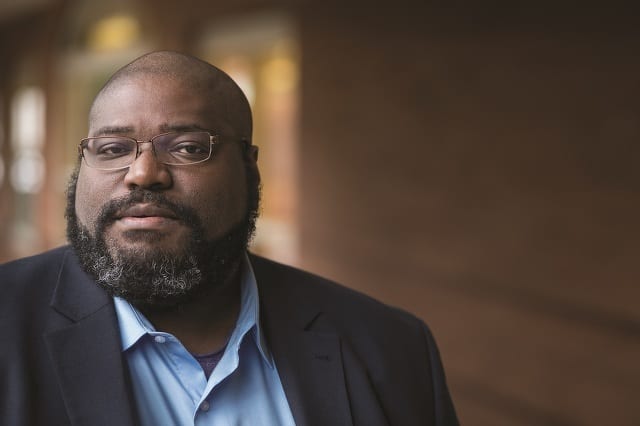Terry Watson’s family has a rich history in law enforcement. His great-grandfather Moses P. Cobb was the first black police officer to have a full career in New York City. His great-uncle Samuel Battle was the first African-American detective in the NYPD.
Their experiences helped inspire Watson, of State College, to develop a speakers bureau called Battle with Moses People to spark dialogue on inequities inside and outside of law enforcement. Last year, Watson founded Strategies for Justice to “create a meaningful and effective push for justice.”
Town&Gown spoke with Watson in the wake of the national calls for change after the killing of George Floyd in Minneapolis.
T&G: Do you see the death of George Floyd as a tipping point in bringing about tangible change to address racial equity in policing and society as a whole?
Watson: I believe that the killing of George Floyd may have shocked the consciousness of America, especially concerning the conversation about policing and the black community. As to what effect this will have long-term, I can only remain optimistic.
I will note, though, that police officers and police organizations/unions from different racial backgrounds did speak out on this issue. Personally, my cellphone and website messages have been filled with police officers I have spoken to throughout the years condemning this killing. This is a first. My message to them is to speak out when you see injustice, always, and to acknowledge this goes beyond George Floyd.
T&G: As of this writing, it has been about 15 months since the death of Osaze Osagie in State College. You led a community discussion that included police officers in the weeks after his death. Have you continued to work with local law enforcement and community leaders since then?
Watson: Indeed I have. I am always thinking about our local law enforcement, because this is my family’s community. The shooting of Osaze Osagie still is an open wound in this community. What is essential is that our local law enforcement pays attention to our young people and coalitions like 3/20. I continually remind law enforcement that there is a responsibility to address generational trauma.
As for Strategies for Justice (SFJ), this spring (pre-COVID), I started a competition titled “What is Justice?” The 2020 theme was, remembering Osaze Osagie. The purpose of this competition was to listen to the voice of our youth. SFJ donated to this fund, and I asked community members and businesses to match my donation.
T&G: Are we making progress in this community in addressing racial equity?
Watson: Yes and no. It looked like we were on the path to making progress, then we got hit with a national pandemic. I again must remain optimistic that moving back to the green means some of the efforts of local groups and organizations like Community & Campus in Unity (CCU), Showing up for Racial Justice (SURJ), 3/20, and the State College NAACP can resume.
T&G: On a systemic level, what needs to change in the short term? In the longer term?
Watson: Foremost, we need to humanize each other. We need to un-program and reteach our minds. The consciousness that allows us to see a man killed on tape and sleep peacefully at night is the same consciousness that justified the Red Summer of 1919. As I write this, I am in Buffalo, New York, and working with a dear friend and SFJ speaker, Cariol Horne. We are fighting to get her pension after she, a police officer, stopped the choking of a handcuffed suspect and was fired. Also, we are trying to pass Cariol’s Law in New York, but not just stop there.
Long term, we need to start by protecting our police officers who speak up and speak out when they see injustice. We need to protect police who intervene when they see a fellow police officer acting outside of their training. We need to protect police officers who are in our community, for the community. We need to protect the police, who protect us.
T&G: Please tell us about some of the key things Battles with Moses People and Strategies for Justice are doing to help bring about change.
Watson: We are still offering speaking opportunities and hosting Moses People Speak (a web show). But my dream has been to bring folks together. So in April 2021 (pandemic-dependent), we are looking to hosting the first Symposium on Consciousness Law Enforcement and Inclusive Practices. We currently have a couple of bites for locations, but we want to focus on a space where it is needed.
This symposium will strategically bring together law enforcement, social-justice activists, trauma counselors, and academia to help us heal and create an action plan to develop inclusive practices, inside and outside of law enforcement.
Leading up to that, we are hosting free virtual forms that people can attend and participate in. There will be one each month. The first two are ready to go for June and July, and I am excited about the ones in the works. To sign up or to help plan visit, strategiesjustice.com/symposium.
T&G: What can community members who want to make a difference do?
Watson: Go to SFJ’s website and become a member. We are looking for members to help plan programs, advertise speakers, and help change culture. This year, due to a need for change, membership is free. It’s a year’s commitment, but a lifetime worth of difference.



